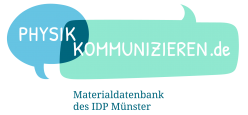Microcontrollers have many different points of contact in modern physics lessons. Simple experiments with connected sensors and actuators make it possible to impart practical content and skills in almost every field of school physics such as acoustics, electricity, thermodynamics or optics. The learning is action-oriented, individualized, creative and problem-solving. In addition, the “black box” of measuring devices can be opened if something is learned about the physical and technical functionality of the sensors used and about the measurement itself. When getting started with Arduino, however, various difficulties and problems can arise: Starting with a new computer program and a programming language, to implementing circuits with breadboards to the physics and technology behind the components.
 In order to learn the basics of programming on simple projects such as temperature, light intensity and distance measurements, a concept that has been tried and tested with students, teachers is ideal: The learners first receive ready-made circuits (see image above) as well as a matching basic program that puts the circuit into operation in a rudimentary way. New program commands are introduced with the basic programs and explained directly through comments in the program code. The basic program also includes various learning tasks that gradually expand the basic program to learn how to use loops and queries, read out analog inputs or convert values, among other things. The circuits can be used to implement complex everyday and application-oriented projects such as optical and acoustic parking assistance, brightness-dependent multi-level lighting or a traffic light with requirement contact. The data sheet provides contexts, possible applications and background information on the components.
In order to learn the basics of programming on simple projects such as temperature, light intensity and distance measurements, a concept that has been tried and tested with students, teachers is ideal: The learners first receive ready-made circuits (see image above) as well as a matching basic program that puts the circuit into operation in a rudimentary way. New program commands are introduced with the basic programs and explained directly through comments in the program code. The basic program also includes various learning tasks that gradually expand the basic program to learn how to use loops and queries, read out analog inputs or convert values, among other things. The circuits can be used to implement complex everyday and application-oriented projects such as optical and acoustic parking assistance, brightness-dependent multi-level lighting or a traffic light with requirement contact. The data sheet provides contexts, possible applications and background information on the components.
Materials
Below you can download the basic programs and data sheets for the finished Arduino circuits („Arduino shields“). The materials will be gradually translated into English. If you would like to translate the materials into other languages, please contact me.
Contact for more information Alexander Pusch

